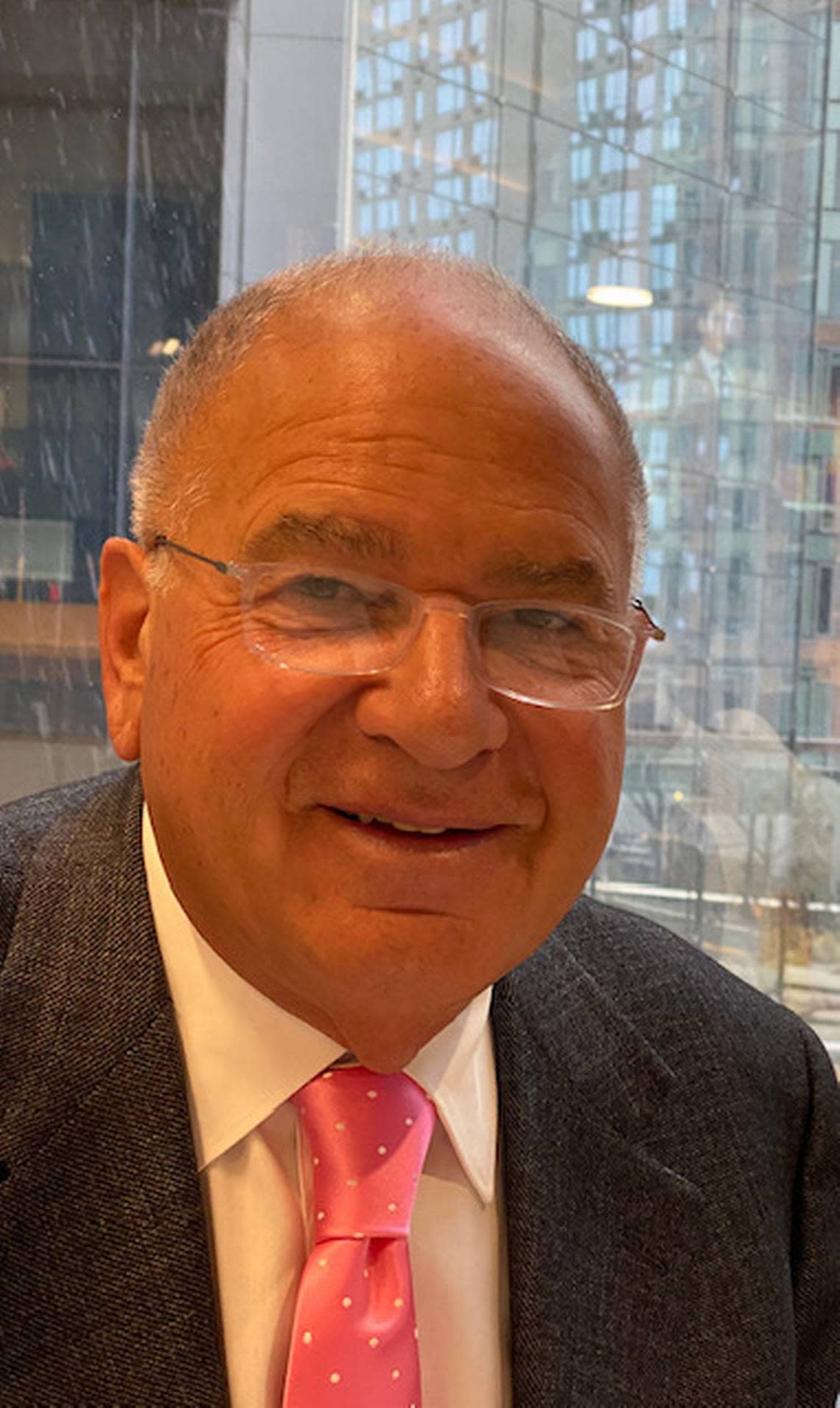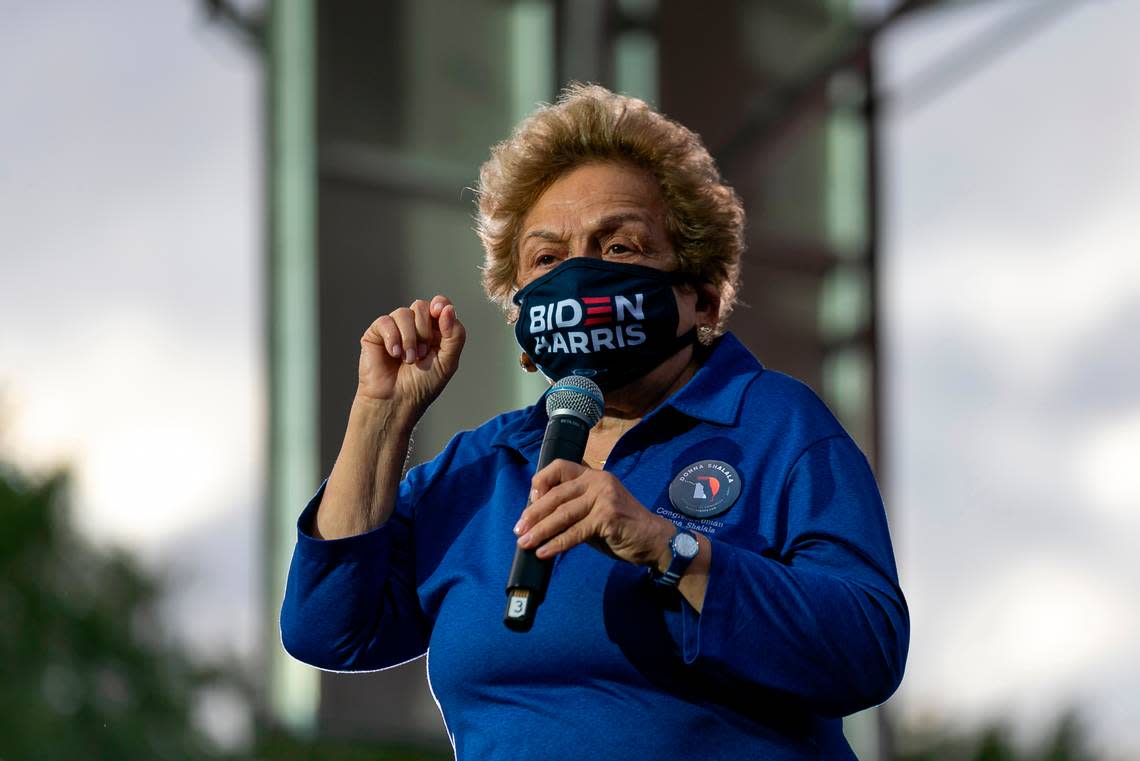Jury sides with UM in legal fight over Shalala’s firing of No. 2 exec at med school
The University of Miami won a major legal battle Tuesday against a former top medical school official who accused ex-president Donna Shalala of firing him a decade ago in retaliation for ordering an independent investigation of excessive billing in an organ-testing lab at the school’s renowned transplant institute.
Former Chief Operating Officer Jonathan “Jack” Lord was hoping a federal jury would award him millions of dollars in back pay and other damages dating back to his firing. But the six-person Miami federal jury found that Shalala terminated Lord for reasons unrelated to his “protected activity” as a whistle-blower at UM’s medical school.
The jury reached that conclusion, resulting in no damages, despite finding that as the second-in-command at the medical school, Lord “engaged in protected activity” as a whistle-blower under federal law and Shalala “knew” about it before she decided to end his 10-month tenure in January 2013.
Shalala, 81, testified at trial that she fired Lord because she saw him as a “destructive force” who may have helped restore financial stability in the UHealth system through sweeping layoffs. But she defended her action, arguing that he ultimately poisoned the medical school by treating laid-off employees harshly, lowering staff morale and losing the respect of his colleagues.
“He was fired because of his conduct on the medical school campus,” UM’s defense attorney, Eric Isicoff, said during closing arguments Monday, citing a doctors’ petition with hundreds of signatures blaming Lord and the school’s dean for their “failed leadership.”
“The evidence is all about an opportunistic effort to get a bunch of money out of the university of Miami,” Isicoff said, adding that the issue over the audit of the organ-testing lab was a “red herring” and that Shalala “knew nothing” about overbilling and possible Medicare fraud at the organ-testing lab before firing Lord.

On that latter point, however, the jury concluded otherwise — though it didn’t find that Shalala fired Lord in retaliation for blowing the whistle on the lab.
Lord, 68, who had attended UM as an undergraduate and medical school student, testified that Shalala fired him after he authorized the external audit of the organ-testing lab in the university’s surgery department at Jackson Memorial Hospital, pointing out to her that it might owe Medicare at least $10 million for unnecessary tissue testing. Lord also testified that he suspected the lab was committing Medicare fraud — and informed senior colleagues, including the medical school’s dean and compliance officer — though no criminal case was ever brought against the university or individuals
“Her motive for firing Jack was to silence him” while shutting down the outside audit and assigning it to UM auditors who did nothing, Lord’s attorney, Jeffrey Sloman, said during closing arguments.
“When the university pushed back, he tried to do the right thing,” Sloman told the jurors.
After jurors returned with their verdict following five hours of deliberations, Sloman said “it was very disappointing.”
The trial, presided over by U.S. District Judge Cecilia Altonaga, presented starkly different versions of testimony surrounding Lord’s firing and decade-old lawsuit. It also pulled back the curtain on the UM medical school’s historic financial troubles and turf wars between medical school departments and influential doctors in the teaching hospital at Jackson, which is publicly owned but staffed by UM doctors.
The trial also signified a comeback for UM. Last year, Lord’s False Claims Act case against the university resulted in UM’s $22 million settlement with the Justice Department to resolve civil allegations of inflated Medicare billing by the school’s organ-testing lab and other violations. The university admitted no wrongdoing in the agreement.
As the whistle-blower, Lord received about $4 million of the settlement as a reward for initiating the suit against his former employer. That long-running dispute, however, delayed the start of his wrongful termination trial — and the settlement itself could not be disclosed to the federal jurors.
The high-level personnel dispute began in March 2012 when the university, whose healthcare system was facing deep deficits, hired Lord, a longtime healthcare administrator, as the medical school’s No. 2 executive with a portfolio of rebuilding a medical program known as UHealth. Lord was hired by the medical school’s dean, Pascal Goldschmidt, who fired him under orders from Shalala.

As he collaborated with the dean and other top officials to orchestrate layoffs of some 900 staffers, Lord received written raves from his superiors for the UM health system’s financial turnaround. At Goldschmidt’s request, Lord was given more duties as UM medical school’s chief compliance officer and a raise from $763,000 to $913,000, court records show.
Despite UHealth’s apparent turnaround, Goldschmidt and Lord became instantly unpopular for the layoffs, stirring up a schism among the medical school faculty, led by its influential chief of surgery, Alan Livingstone. Their status grew tenuous when Lord discovered rising tensions between UM’s surgery and pathology departments over organ lab testing for the transplant institute at Jackson. The surgery department, under Livingstone management, controlled the profitable tissue-testing lab.
But after two pathology department doctors accused surgery’s lab of overbilling Medicare and an anonymous letter to the U.S. Department of Health and Human Services accused it of committing fraud, Lord pushed for an independent investigation. Livingstone, who did not appear as a witness at the trial, saw the outside audit as a threat and complained to Shalala and UM board of trustee chairman Leonard Abess, according to emails and testimony.
Before his termination, Lord alerted Shalala, the medical school’s dean and the UM board of trustees about the fraud allegations involving excessive billing at the organ-testing lab, according to his testimony and court records. With the medical school dean’s backing, Lord and another top compliance officer authorized an external audit of “billing irregularities” in the lab estimated to be at least $10 million — information that they brought to Shalala’s attention.
But rather than keep it going, Lord testified at his wrongful termination trial, Shalala shut down the independent audit under direct pressure from Livingstone, brought the review in-house and then fired the medical school’s chief operating officer.
Shalala testified that Lord’s firing “had nothing to do” with his blowing the whistle on excessive billing and possible Medicare fraud at UM’s organ-testing lab at Jackson. She said that she wasn’t retaliating against Lord. “Absolutely not,” she said.
Shalala also denied that she was influenced by Livingstone in making her decision to move the external audit of the organ-testing lab in-house under UM auditors — that it wasn’t a cover-up. “The opposite,” said Shalala, who served as a cabinet member in the Clinton administration and one term as a Miami congresswoman and now teaches at the university.
However, Jennifer McCafferty, who was UM’s former chief medical compliance officer, testified on Friday that she was “disappointed” when she learned that Shalala consulted with Livingstone, shut down the external audit and brought it in-house. McCafferty, who is married to Shalala’s former chief of staff, Rudy Fernandez, testified that the university’s own probe of the organ-testing lab “could have been compromised.”
According to trial testimony and records, UM’s internal auditors found no irregular billing or Medicare fraud at the lab in 2013. But later that year, the university agreed to reimburse $356,000 to Medicare regarding disputed bills for transplant lab tests by UM’s surgery department, records show. That payment was separate from UM’s multimillion-dollar settlement over the same issue with the Justice Department last year.
“This internal audit was a fix and it was swept under the rug,” Lord’s attorney, Sloman, said in closing arguments before the jury began deliberations late Monday.
